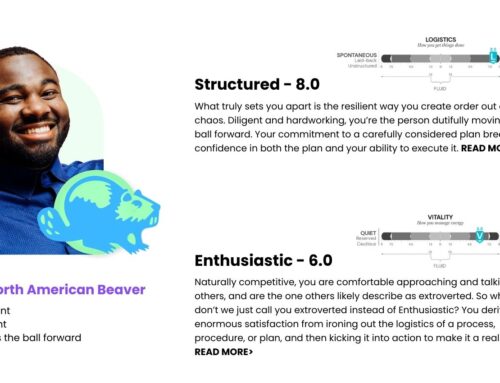How Your Personality Can Impact Your Career
If you’re eager to earn more money, hold greater control over your professional destiny, or even retire when you’re still young enough to enjoy it, get to know yourself. Then make the behavioral adjustments necessary to succeed.
A growing body of research shows that, all other things being equal, your personality goes a long way in determining how well you do in the workplace. And while you can’t really do much to rearchitect your personality, there are tactics and practices that can help you shore up any weaknesses while simultaneously leveraging your strengths.
The Power of Personality
We all know that education plays a role in our professional lives. A college graduate is going to fare better than a high school graduate who in turn will likely outperform a high school dropout.
Experience also helps. If you’ve been at a job for 10 years you’re almost certainly going to hold more power and earn more money than the newbie.
But in recent years, the folks who study workplace performance have started to look at personality as a predictor of professional success. Their discovery? That in many cases personality can be a better predictor of success than education, skills, or experience.
Winning Personalities
So which personalities are associated with career success?
In one of the first studies to associate Big 5 personality traits with professional success, researchers discovered a number of intriguing connections between distinct traits and job performance, including:
- Enthusiastic – High-energy, outgoing types were generally happier with their salaries and career track than quieter, more introverted types
- Emotion – Individuals who are more emotionally reactive were less satisfied with their careers
- Ideation – People who are more Imaginative tend to earn less than their more Practical counterparts
- Accommodation – More Giving types were generally unhappy with their career paths and also earned less when working in people-oriented professions (this was not the case when their work was not people-centric)
More recent studies have confirmed many of these findings and also found that those who score especially high on the Structured side of the Logistics trait perform especially well and express the highest level of job satisfaction. All of which makes sense given that these are individuals who pride themselves on getting the job done, even if that means pulling an all-nighter, doing extra research, or staying at the desk while everyone else is at the company happy hour.
And as the name suggests, Structured people are also more orderly and, well, structured. They know how to get things done and if they don’t they figure it out or find someone who can help. As a result, they also enjoy higher levels of self-confidence which, itself, can contribute to stronger earnings.
Changing the Formula
So what are the more accommodating, emotionally reactive, imaginative types to do if they want to earn more, land regular promotions, and otherwise enjoy career success?
While you can’t rearchitect your underlying personality, you can make adjustments to some of the behaviors that stem from that personality. By doing so you not only shore up any perceived weak spots but you change the perception of others.
In a 2020 study published in the journal of Psychological Science, for example, researchers found that a change in perspective and the behaviors stemming from it can go a long way in helping people improve their workplace results.
Let’s say you’re a Quiet, introverted type. You don’t need to force yourself to be more extroverted to enjoy success at work (you’ll ultimately fail, anyway, and exhaust yourself in the process). Instead, consider making a few tweaks to your daily habits. For example, instead of waiting last to speak up in a meeting or not speaking at all (as is often the habit with Quiet types), remind yourself to chime in early – and occasionally first – even if your thoughts aren’t fully formed. Remember, more extroverted people do this all the time under the label, ‘thinking out loud.’
By doing so you’ll invariably change some of the erroneous perceptions of others that may be holding you back (e.g. has nothing to say, isn’t paying attention, and so on). Yes, these perceptions are unfair, but as goes the saying, perception is 99% of reality. So change that reality!
These same kinds of changes can be made for any personality type. And because personality is increasingly seen as fundamental to workplace success, master your understanding of your personality and adjust any behaviors that may be holding you back.
How Your Personality Can Impact Your Career
If you’re eager to earn more money, hold greater control over your professional destiny, or even retire when you’re still young enough to enjoy it, get to know yourself. Then make the behavioral adjustments necessary to succeed.
A growing body of research shows that, all other things being equal, your personality goes a long way in determining how well you do in the workplace. And while you can’t really do much to rearchitect your personality, there are tactics and practices that can help you shore up any weaknesses while simultaneously leveraging your strengths.
The Power of Personality
We all know that education plays a role in our professional lives. A college graduate is going to fare better than a high school graduate who in turn will likely outperform a high school dropout.
Experience also helps. If you’ve been at a job for 10 years you’re almost certainly going to hold more power and earn more money than the newbie.
But in recent years, the folks who study workplace performance have started to look at personality as a predictor of professional success. Their discovery? That in many cases personality can be a better predictor of success than education, skills, or experience.
Winning Personalities
So which personalities are associated with career success?
In one of the first studies to associate Big 5 personality traits with professional success, researchers discovered a number of intriguing connections between distinct traits and job performance, including:
- Enthusiastic – High-energy, outgoing types were generally happier with their salaries and career track than quieter, more introverted types
- Emotion – Individuals who are more emotionally reactive were less satisfied with their careers
- Ideation – People who are more Imaginative tend to earn less than their more Practical counterparts
- Accommodation – More Giving types were generally unhappy with their career paths and also earned less when working in people-oriented professions (this was not the case when their work was not people-centric)
More recent studies have confirmed many of these findings and also found that those who score especially high on the Structured side of the Logistics trait perform especially well and express the highest level of job satisfaction. All of which makes sense given that these are individuals who pride themselves on getting the job done, even if that means pulling an all-nighter, doing extra research, or staying at the desk while everyone else is at the company happy hour.
And as the name suggests, Structured people are also more orderly and, well, structured. They know how to get things done and if they don’t they figure it out or find someone who can help. As a result, they also enjoy higher levels of self-confidence which, itself, can contribute to stronger earnings.
Changing the Formula
So what are the more accommodating, emotionally reactive, imaginative types to do if they want to earn more, land regular promotions, and otherwise enjoy career success?
While you can’t rearchitect your underlying personality, you can make adjustments to some of the behaviors that stem from that personality. By doing so you not only shore up any perceived weak spots but you change the perception of others.
In a 2020 study published in the journal of Psychological Science, for example, researchers found that a change in perspective and the behaviors stemming from it can go a long way in helping people improve their workplace results.
Let’s say you’re a Quiet, introverted type. You don’t need to force yourself to be more extroverted to enjoy success at work (you’ll ultimately fail, anyway, and exhaust yourself in the process). Instead, consider making a few tweaks to your daily habits. For example, instead of waiting last to speak up in a meeting or not speaking at all (as is often the habit with Quiet types), remind yourself to chime in early – and occasionally first – even if your thoughts aren’t fully formed. Remember, more extroverted people do this all the time under the label, ‘thinking out loud.’
By doing so you’ll invariably change some of the erroneous perceptions of others that may be holding you back (e.g. has nothing to say, isn’t paying attention, and so on). Yes, these perceptions are unfair, but as goes the saying, perception is 99% of reality. So change that reality!
These same kinds of changes can be made for any personality type. And because personality is increasingly seen as fundamental to workplace success, master your understanding of your personality and adjust any behaviors that may be holding you back.



